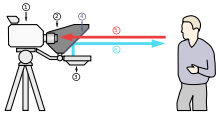|
One-way mirror
 A one-way mirror, also called two-way mirror[1] (or one-way glass, half-silvered mirror, and semi-transparent mirror), is a reciprocal mirror that appears reflective from one side and transparent from the other. The perception of one-way transmission is achieved when one side of the mirror is brightly lit and the other side is dark. This allows viewing from the darkened side but not vice versa. HistoryThe first U.S. patent for a one-way mirror appeared in 1903, then named a "transparent mirror".[2][3] Principle of operation  The glass is coated with, or has been encased within, a thin and almost transparent layer of metal (window film usually containing aluminium). The result is a mirrored surface that reflects some light and is penetrated by the rest. Light always passes equally in both directions. However, when one side is brightly lit and the other kept dark, the darker side becomes difficult to see from the brightly lit side because it is masked by the much brighter reflection of the lit side.[4] Applications A one-way mirror is typically used as an apparently normal mirror in a brightly lit room, with a much darker room on the other side. People on the brightly lit side see their own reflection—it looks like a normal mirror. People on the dark side see through it—it looks like a transparent window. The light from the bright room reflected from the mirror back into the room itself is much greater than the light transmitted from the dark room, overwhelming the small amount of light transmitted from the dark to the bright room; conversely, the light reflected back into the dark side is overwhelmed by the light transmitted from the bright side. This allows a viewer in the dark side to observe the bright room covertly. When such mirrors are used for one-way observation, the viewing room is kept dark by a darkened curtain or a double door vestibule. These observation rooms have been used in:
Smaller versions are sometimes used in:
The same type of mirror, when used in an optical instrument, is called a beam splitter and works on the same principle as a pellicle mirror. A partially transparent mirror is also an integral part of the Fabry–Pérot interferometer. See alsoReferences
External links
|